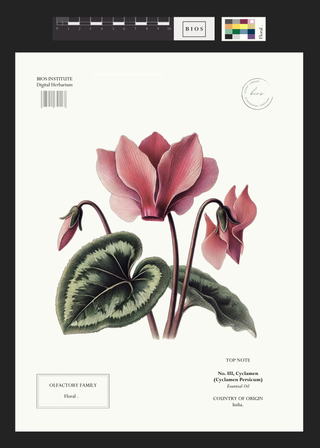

Cyclamen, also known as Cyclamen persicum, is a flowering plant that is prized in perfumery for its delicate and enchanting fragrance. Commonly known as the Persian cyclamen or florist's cyclamen, it is native to the eastern Mediterranean region. It is believed to have originated in countries such as Turkey, Syria, Lebanon, Israel, and the surrounding areas. Ours is sourced from India, where it is commonly grown as a potted plant for indoor or outdoor ornamental purposes. It is admired for its attractive cyclamen-shaped flowers and marbled leaves, making it a charming addition to gardens, balconies, and flowerpots.
Cyclamen has a light, fresh, and floral fragrance with subtle spicy and green undertones. Its scent is often described as powdery, ethereal, and slightly sweet. Cyclamen possesses a captivating and romantic quality, making it a popular choice for perfumers.
Cyclamen is a Top note in our Floral family. Its aroma blends well with other floral notes, especially when creating feminine and delicate perfume compositions. Cyclamen adds a touch of elegance, freshness, and sophistication to fragrances.
Cyclamen is often incorporated into floral bouquets in perfumery. Its fragrance brings a soft and romantic aura to floral compositions, adding depth and complexity. Cyclamen blends harmoniously with other flowers like rose, jasmine, violet, and lily of the valley, creating intricate and multi-dimensional scent profiles.
Due to its light and ethereal nature, cyclamen is commonly used in perfumes targeted towards women. Its delicate floral scent lends itself well to feminine, elegant, and romantic fragrance creations. Cyclamen can be found in various perfume categories, including floral, fruity-floral, and chypre compositions.
Cyclamen's fragrance is often associated with a whimsical and youthful character. Its light and airy aroma can evoke feelings of innocence, freshness, and playfulness. Cyclamen is sometimes used in perfumes aimed at capturing the essence of springtime or evoking a sense of joy and optimism.
Cyclamen is also used in perfumery to create specific accords or scent combinations. For example, it can be paired with green notes, such as violet leaf or galbanum, to create a fresh and vibrant accord. Cyclamen can also contribute to powdery or musky accords, adding a soft and velvety touch to the overall fragrance.
Overall, cyclamen is valued in perfumery for its enchanting and romantic fragrance. Its delicate floral scent is a popular choice for creating feminine perfumes and adding elegance and freshness to fragrance compositions. Whether used as a standalone note or as part of a floral bouquet, cyclamen brings a touch of whimsy and sophistication to perfumes.
Cyclamen has a long history of use in traditional medicine. Various parts of the plant, including the tubers and leaves, have been used for their potential therapeutic benefits. Cyclamen was believed to have medicinal properties such as diuretic, expectorant, and purgative effects. It was used to treat respiratory conditions, digestive issues, and certain skin ailments. However, it's important to note that traditional uses of cyclamen for medicinal purposes are not well-supported by scientific evidence, and caution should be exercised.
Cyclamen has been cultivated as an ornamental plant for centuries. Its beautiful and unique flowers, with their distinct shape and vibrant colors, have made it a popular choice for gardens and indoor plantings. Throughout history, cyclamen has been appreciated for its aesthetic appeal and has been cultivated in various regions worldwide.
Cyclamen has also acquired symbolic meanings in certain cultures. In some folklore and literary traditions, cyclamen has been associated with themes of love, purity, and rebirth. Its delicate and ephemeral nature has been used as a metaphor for the transient and fragile aspects of life. Cyclamen flowers have appeared in mythological stories and poetry, often carrying symbolic significance.
Cyclamen flowers have been used as decorative elements in festivals, celebrations, and floral arrangements. Their unique shape and vibrant colors make them eye-catching additions to bouquets, centerpieces, and floral displays.
Cyclamen
- Unit price
- /per
Please note this product format is a small vial that contains roughly 20 drops of scent concentrate. This can be purchased à la carte but is intended to be used with our Perfume Kit.
SCENT SPECIFICATIONS
Latin Name: Cyclamen Persicum
Extraction Method: Steam Distilled
Country of Origin: India
All of the scents in our library our naturally derived - our collection includes essential oils, absolutes, concretes, isolates, enfleurage, macerations, oleoresins, and mixed medium naturals.
Adding product to your cart
Cyclamen, also known as Cyclamen persicum, is a flowering plant that is prized in perfumery for its delicate and enchanting fragrance. Commonly known as the Persian cyclamen or florist's cyclamen, it is native to the eastern Mediterranean region. It is believed to have originated in countries such as Turkey, Syria, Lebanon, Israel, and the surrounding areas. Ours is sourced from India, where it is commonly grown as a potted plant for indoor or outdoor ornamental purposes. It is admired for its attractive cyclamen-shaped flowers and marbled leaves, making it a charming addition to gardens, balconies, and flowerpots.
Cyclamen has a light, fresh, and floral fragrance with subtle spicy and green undertones. Its scent is often described as powdery, ethereal, and slightly sweet. Cyclamen possesses a captivating and romantic quality, making it a popular choice for perfumers.
Cyclamen is a Top note in our Floral family. Its aroma blends well with other floral notes, especially when creating feminine and delicate perfume compositions. Cyclamen adds a touch of elegance, freshness, and sophistication to fragrances.
Cyclamen is often incorporated into floral bouquets in perfumery. Its fragrance brings a soft and romantic aura to floral compositions, adding depth and complexity. Cyclamen blends harmoniously with other flowers like rose, jasmine, violet, and lily of the valley, creating intricate and multi-dimensional scent profiles.
Due to its light and ethereal nature, cyclamen is commonly used in perfumes targeted towards women. Its delicate floral scent lends itself well to feminine, elegant, and romantic fragrance creations. Cyclamen can be found in various perfume categories, including floral, fruity-floral, and chypre compositions.
Cyclamen's fragrance is often associated with a whimsical and youthful character. Its light and airy aroma can evoke feelings of innocence, freshness, and playfulness. Cyclamen is sometimes used in perfumes aimed at capturing the essence of springtime or evoking a sense of joy and optimism.
Cyclamen is also used in perfumery to create specific accords or scent combinations. For example, it can be paired with green notes, such as violet leaf or galbanum, to create a fresh and vibrant accord. Cyclamen can also contribute to powdery or musky accords, adding a soft and velvety touch to the overall fragrance.
Overall, cyclamen is valued in perfumery for its enchanting and romantic fragrance. Its delicate floral scent is a popular choice for creating feminine perfumes and adding elegance and freshness to fragrance compositions. Whether used as a standalone note or as part of a floral bouquet, cyclamen brings a touch of whimsy and sophistication to perfumes.
Cyclamen has a long history of use in traditional medicine. Various parts of the plant, including the tubers and leaves, have been used for their potential therapeutic benefits. Cyclamen was believed to have medicinal properties such as diuretic, expectorant, and purgative effects. It was used to treat respiratory conditions, digestive issues, and certain skin ailments. However, it's important to note that traditional uses of cyclamen for medicinal purposes are not well-supported by scientific evidence, and caution should be exercised.
Cyclamen has been cultivated as an ornamental plant for centuries. Its beautiful and unique flowers, with their distinct shape and vibrant colors, have made it a popular choice for gardens and indoor plantings. Throughout history, cyclamen has been appreciated for its aesthetic appeal and has been cultivated in various regions worldwide.
Cyclamen has also acquired symbolic meanings in certain cultures. In some folklore and literary traditions, cyclamen has been associated with themes of love, purity, and rebirth. Its delicate and ephemeral nature has been used as a metaphor for the transient and fragile aspects of life. Cyclamen flowers have appeared in mythological stories and poetry, often carrying symbolic significance.
Cyclamen flowers have been used as decorative elements in festivals, celebrations, and floral arrangements. Their unique shape and vibrant colors make them eye-catching additions to bouquets, centerpieces, and floral displays.
